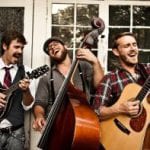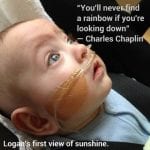HEARING EVERYONE’S STORY: Ben Sollee’s stunning new album INCLUSIONS builds community
Ben Sollee believes that community is all about inclusion. And music is about inclusions. So it’s no wonder his new album bears that title.
INCLUSIONS, Sollee’s second solo record, released May 10 by Thirty Tigers, is a sort of folk-urban stroll through all that is being gained—and lost—in modern society. “From an arts standpoint, there’s more mixing, melding collaboration than ever before,” Sollee says. “The idea behind the album is that some of them are intentional, some are incidental but they happen and they help define who we are now.”
Sollee is the epitome of those different influences. His grandfather was a fiddler from the lush, dark heart of Appalachia and Sollee grew up hearing his father playing R&B on the guitar. He also grew up hearing of his family’s heritage in the hills while he experienced a whole different way of life in the maintained urban landscape of Lexington, Kentucky, a sprawling metropolitan area struggling to become a big city.
INCLUSIONS, he says, is an attempt to embody in a very literal way all the influences that are part of his life: the city, the rolling hills around it, the mountains beyond it, the entire global community that is a part of everyone’s daily life in a way it never has been before.
“I love this record,” Sollee admits. “I love it for all of its meanings, explicit and incidental. I love the people I got to work with and the sound they helped create. I love how challenging it was to excavate some of the musical ideas and how others washed up in conversation. In these songs, I can hear the city I grew up in and the people that lived down the street.”
Sollee has gained a rabid fanbase in a relatively short period, and the pounding rhythms, keenly specific songwriting, and tight vocals of INCLUSIONS are sure to expand it.
Sollee burst onto the scene only three years ago with his 2008 debut, LEARNING TO BEND, which was featured on NPR and led to Sollee being internationally booked. During this same time he toured with Abigail Washburn as part of the Sparrow Quartet, which also featured fiddler Casey Driessen and banjoist Bela Fleck in a tour that explored the similarities of eastern and western folk music. That collaboration even led to Sollee being part of a US Ambassadorial tour of Tibet.
His music also drew the attention of My Morning Jacket frontman Yim Yames, who went onto produce Sollee’s second record, a collaboration with fellow Kentuckian Daniel Martin Moore. In 2010 the pair released DEAR COMPANION, a stunning collection of songs meant to inspire environmental stewardship.
Yames admires Sollee the person as much as Sollee the musician. “Ben’s songs speak worldly wisdom and stand on their own, and he is out there in this world with those songs and that cello and that god-given voice of his, riding his bike and fighting the good fight and doing all he can to help make the world right,” Yames says.
Which leads to another inclusion.
Sollee’s shows are more than mere concerts where folks file in, see a show, and then leave. Sollee has orchestrated his shows so that they become community events. For the premiere of INCLUSIONS at the historic Kentucky Theatre in Lexington, Sollee put out a call for folks to ride their bikes to the show for a chance to win a prize and made sure that bike racks and even bike valet parking were available. The bike racks out front were full, with more than fifty people arriving via bicycle. Sollee also donated a portion of the show’s proceeds to a local bike shop, the Broke Spoke, a volunteer-based organization that provides maintenance and parts for folks who need help with their bikes in trade for donating your own time or other ways of bartering. The shop also sells used bikes but they’re not there to make a profit so much as they’re there to provide an affordable vehicle for those who need it.
Sollee also includes artists from the community to make items for his merch table. He and his wife even collaborated on a limited edition songbook of a few of his songs. Bags were made by a local group, broadsides printed up a local hand-lettered press, posters designed by another local press. “It’s an experiment,” he says. “I’m trying to use the merch table as a gathering place where people can not only get the music but they can also find out about other artists in their area, to get locally-made products. It’s a community-minded effort; I didn’t want that community-building to stop at the show, I wanted them to take the merch and take it on and think more about it the community.”
All of this makes sense when one takes into account that traditionally music has been a social event, but now that people can just go into their shadowy bedrooms and click a mouse to download a song, some of the social aspects of music are being lost. The digital restructuring of music has had even more of an effect on the musicians themselves. “Typically musicians have played with other people,” Sollee says. “We’ve lost that, to some degree, with people being able to record their own records.”
And gigs can be the antithesis of community if the artist simply comes out on a stage, plays a few songs, then disappears into the wings. Sollee sees each show as a way to build community, to further those inclusions. On his last tour he sometimes went on late-night rides with anyone who had shown up on a bicycle. A show in Louisville found him wheeling about the streets being followed by a herd of riders who eventually wound up at a local watering hole to drink and visit with one another.
Additionally, for most of his 2010 tour, Sollee embarked on what he called the “Ditch the Van Tour.” Sollee and his band left behind all motorized vehicles and hauled themselves—and their gear (even the cello) across the nation on bicycles. Again, this was more about community than about being green or sustainable, despite the importance of those two things to Sollee. He says that riding the bikes across the country allowed him to discover people and the specifics of the places in a way that riding a van would have avoided. “Being able to slow down and experience the rich communities and people is so much better than flying by or driving past,” he says.
Sollee also recruits artists with whom he forms relationships to be a part of his shows. In the past he has invited writers to come on and give readings between the music. He has used renowned artists from his own community like photographer Guy Mendes and painter Phillip March Jones to do his album covers (DEAR COMPANION and INCLUSIONS, respectively). Lately he has focused on working with dancers, filmmakers, and other artists to create a series of stunning videos for the songs on INCLUSIONS. “I have a great interest in the multi-platform of arts,” Sollee says. “I like to watch the way people consume, I ask people how they’re getting their music, I watch them when they go to a website and they almost invariably watch videos. I mean, why just listen when you can see somebody making the music?”
Ultimately, Sollee’s main goal is to be a part of a community, to take the time to hear everyone’s story. “I think what I’m discovering is how important it is to just meet everybody on their own personal, human level,” he says. “Everyday I’m becoming more of a humanist. Everybody I walk up to is somebody to learn something from. Everybody I walk up to is going through his or her own struggle. Having that kind of understanding, that sense of compassion, that’s where I’m trying to come from.”
When you get right down to it, inclusion is the beating heart of music. Perhaps that sense of community is that most important aspect of music, that thing that moves us so profoundly about music that we cannot even articulate it. Sollee has tapped into that, and the songs prove it, just as much as his actions do.
INCLUSIONS is a beautiful, raw, polished collection of songs that should take up residence in every community, the same way Sollee strives to do.
“I’m such a mutt myself, biologically and socially, that it just makes sense to express that as my pedigree,” Sollee says. “In the end, that’s what folk music is all about; each of us telling our own story.” —Silas House .
Silas House is the author of four novels, two nonfiction books, and two plays. He wrote cover stories and long features on Lucinda Williams, Kelly Willis, Nickel Creek, Buddy Miller, Darrell Scott, Hank Williams III, and many others for No Depression (look in the archives for them). His work has appeared in The New York Times, Oxford American, Newsday, The Louisville Review, and many other publications. As a press kit writer, House has written profiles of artists like Kris Kristofferson, LeeAnn Womack, Lucinda Williams, Tim O’Brien, and many others. He currently serves as the NEH Chair of Appalachian Studies at Berea College.
More videos from INCLUSIONS:





